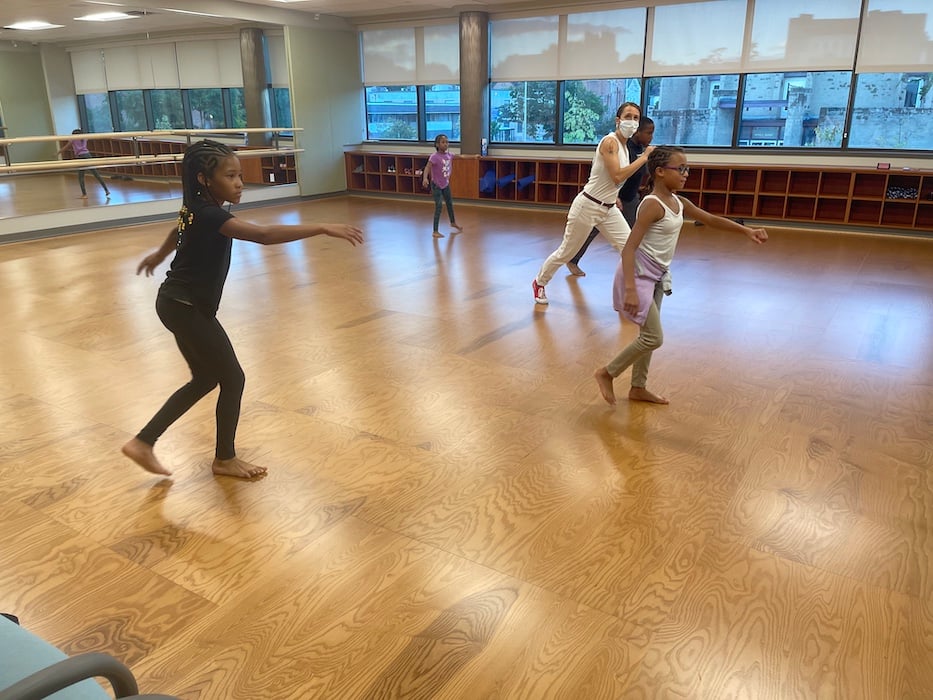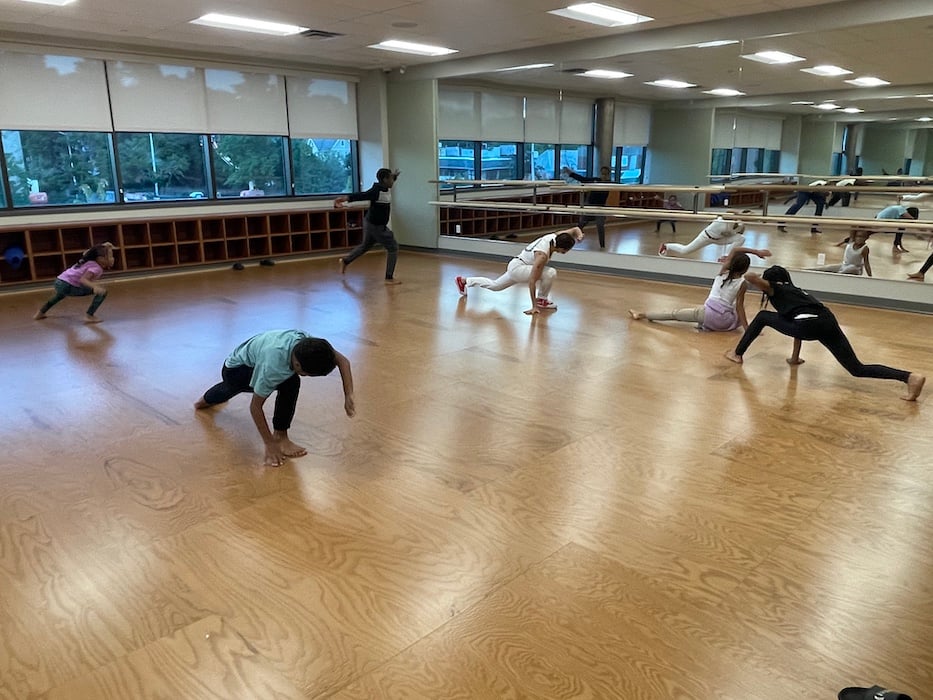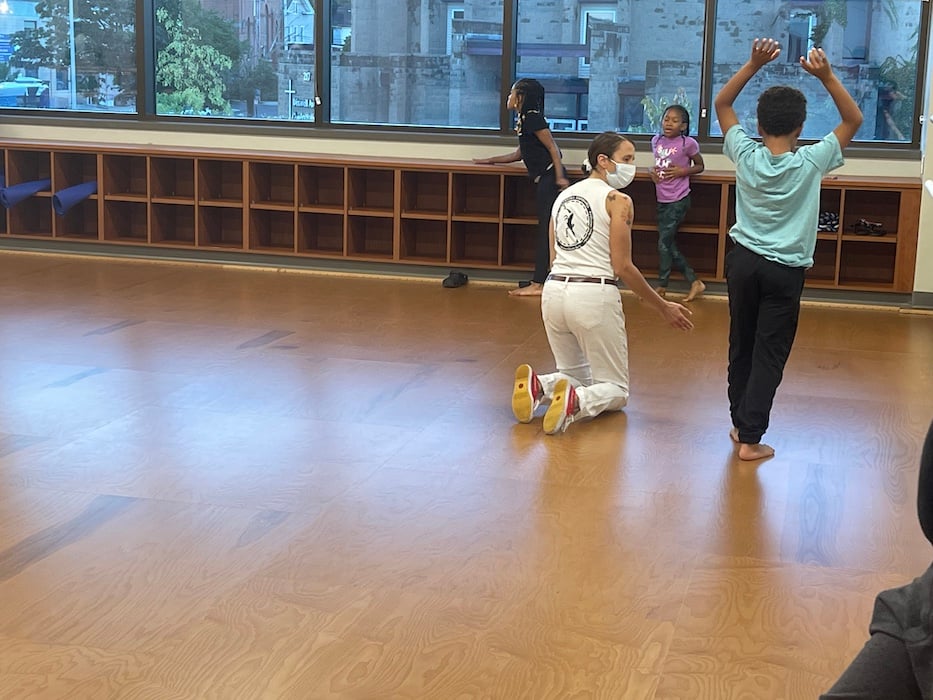
Makeda Murray Photos.
“I don’t want to hear—” Professora Fominha said as she demonstrated a cartwheel where she landed hard on her feet with a loud boom on the floor. “I want to hear mouse feet!”
It was a recent Thursday evening at the Dixwell Community Q House, where a youth capoeira class from Capoeira Esperança CT was unfolding for a small group of students. As Fominha (also known as New Havener Lisa Bergmann) gave instruction, students cartwheeled, kicked, and stood on their hands. As they did, they brought a centuries-old Afro-Brazilian martial art to Dixwell Avenue.
Youth classes currently run Thursdays from 6 to 6:45 p.m. Adult classes run Thursdays from 7 to 7:45 p.m. and Saturdays from 10 to 10:45 a.m. To register or read more about the classes, check out the Q House’s website. The current class period runs January 3 through February 4 of this year at 197 Dixwell Ave.
“Teaching capoeira at the Q House is really a dream come true,” said Fominha in a follow-up phone message, tying the resilient roots of the form to the tenacity of New Haveners who fought for the new Q House. “The way that the Q House has really been part of uplifting the African American community in New Haven, and the whole community … making capoeira there available for everybody is so important. ”

Makeda Murray Photos.
Capoeira, which marries dance and powerful martial artistry, dates back to the 16th century, when enslaved West Africans in Brazil risked punishment if they practiced fighting techniques. Like the Bomba y Plena that are its Afro-Caribbean cousins, it tells a story of resistance dressed as a form of dance. In dances like the Maculelê, for instance, people must communicate with their dance partners through movement and rhythm, learning when to strike their sticks, called grimas, together in unison.
It has withstood the test of time, with cultural stewards from the legendary Mestre Bimba (Manuel dos Reis Machado) to New Haven transplant Mestre Efraim Silva and now Fominha and Robozinho (Daniel Carbajal). The two were part of a group of students-turned-teachers that founded Capoeira Esperança CT after Silva moved to Florida in 2020.
Teachers chose the name Esperança because the word translates to “hope” in Portuguese, Fominha said. The school’s mottos are "community, hope, and unity," she added. After teaching online, outdoors, and with LEAP (Leadership, Education, Athletics in Partnership) during the Covid-19 pandemic, it made its way to the Q House last year.

Makeda Murray Photos.
On a recent Thursday, student Victor Russell lined up with his classmates, working through a series of kicks, turns, and cautious cartwheels with his peers. One by one, students practiced their form, raising their arms gracefully above their heads before they sank into long lunges and then straightened themselves back up. His dad, Xavier Russell, pointed to how engaged his son was in the art form.
“He looks forward to going,” Russell said in a phone call after the class. “It’s a great experience, introducing him to the world of martial arts. I think the class is awesome and is a great experience for all ages.”
“I like all of it, it’s good exercise. And fun,” Victor added.
Bergmann, who grew up outside of Boston, said she is glad to be a part of that history and culture. In 2002, she saw capoeira for the first time while studying abroad in Bolivia, and coming across Brazilian performers. After moving to New Haven in 2003, she studied the art form under Silva, who taught in the state for over 30 years and ran the studio CT Capoeira & Dance.
In addition to Silva, she owes her craft to Brazilian artists who came through Connecticut to teach. Bergmann was given the Capoeira nickname “Fominha”, meaning, “hungry,” because of her enthusiasm to learn and throw herself into the form.
“We come in standing on the shoulders of a long history of capoeira New Haven,” she said.
Teaching at the Q House marks a full-circle kind of moment for her, she added. Prior to November 2021, when the space formally opened its doors, she was very involved in advocacy efforts to reopen the Q House. It is now run by LEAP (Leadership, Education, Athletics in Partnership), with which she has worked as a capoeira instructor in years past. The fit made sense.
Back in the classroom, retired educator Richard Goyner joined in among the students before the end of the class. A member of Capoeira Esperança, he practices qigong, tai chi and karate in addition to capoeira. He said that the form helps him move, “even with my strained hip.”
“Art opened my eyes to the world of dance,” he added.
For Bergmann/Fominha, that’s part of the hope. Every time she steps into a classroom to teach, she knows that she’s carrying centuries of knowledge that have been passed down from generation to generation. She doesn’t take it lightly.
“To be able to be there, to be able to see the kids training, to see people coming together and sharing this experience, that is really a very healing experience, is a wonderful thing,” she said. “Now they're going to have something for their whole lifetime that is really about being playful, and being active, and learning a history of Brazilian culture and Afro-Brazilian culture.
“The music, the movement is something that you have really for your whole lifetime,” she continued. “It's really an honor to be there, and we are really grateful for it.”
Capoeira Esperança CT is offering youth and adult classes at the Dixwell Community Q House through Feb. 4. Register and learn more here. Lucy Gellman contributed reporting. This piece comes to the Arts Paper through an alumni continuation of the Youth Arts Journalism Initiative (YAJI), a program of the Arts Council of Greater New Haven. Read more about the program by checking out the"YAJI" tag. Makeda Murray is an alum of the 5th YAJI cohort and is a junior in New Haven, where she is homeschooled.